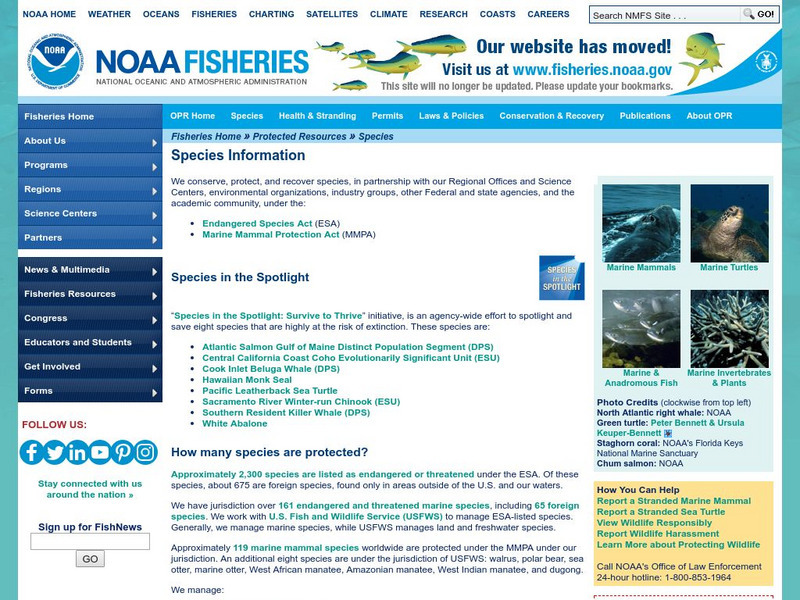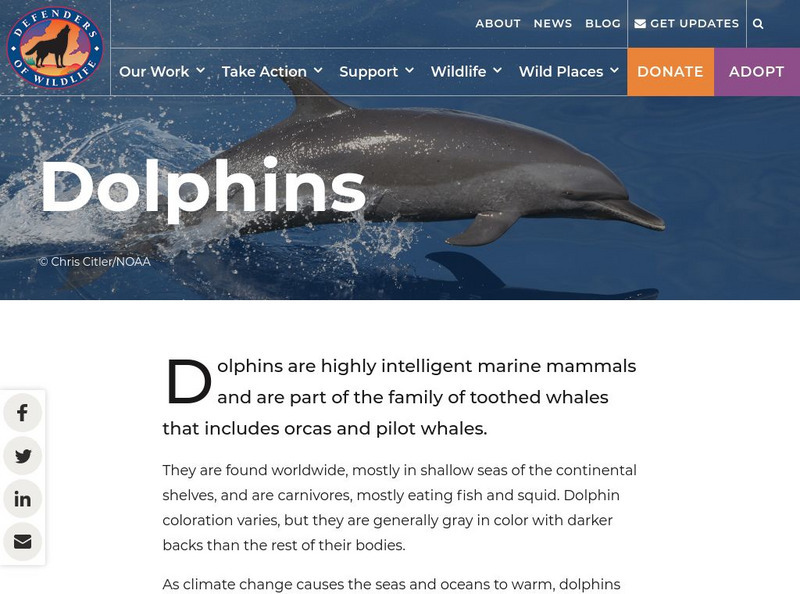Hi, what do you want to do?
Curated OER
Animals: Dolphins
Students use the internet to discover information about dolphins. They examine their behavior, appearance and distribution of dolphins.
Curated OER
Mammals of the Deep Blue
Third graders study ocean mammals. They explore various websites and databases to answer questions and record answers about whales and dolphins. Finally they use the information obtained to write a report about them.
Curated OER
Species Charades
Students identify endangered species. In this endangered species lesson, the teacher leads a discussion about endangered species, then the class plays a game of charades to pantomime animal behavior.
California Academy of Science
Banishing Bycatch
Bycatch is a sad reality for many sea turtles, dolphins, and sharks; it occurs when they get unintentionally caught in commercial fishing nets. The class plays a game using popcorn and crackers, each child will attempt to catch the...
Curated OER
An Alien Has Landed
Learners identify animals within a species by using their observation skills to record information, such as behavioral characteristics.
Sea World
Seaworld Science Activity
A fun collection of activities about marine life would be a great addition to your elementary science unit. From cute penguins to scary sharks, the unit features crafts, experiments, and basic research projects that will teach your...
Curated OER
Online Information: Fact or Fiction
Discuss ways to determine if the information middle and high schoolers gather online is accurate. Using the Internet, they cite two sources that show conflicting points of view on a subtopic of conservation. They summarize and analyze...
Curated OER
Ocean Market
Students identify some consumer goods that come from the ocean.
They classify these items into groups, identify their source, and calculate the cost of buying such goods.
Curated OER
Caught in a Net
Pupils read and discuss the bycatch of the sea and the economic impact of taking bycatch away. In this bycatch lesson plan, students discuss the rights of fisherman and observe pictures of sea animals.
Curated OER
Misplaced and Dangling Modifiers - Exercise 2
Getting tired of seeing dangling or misplaced modifiers in your students' writing? Use this grammar activity to reinforce the importance of careful reading and editing. Young writers find the sentence that has no misplaced or dangling...
Curated OER
Blue Planet: Open Ocean
Students research facts about animal species. In this ocean instructional activity students view a video, prepare illustrated cards and create a food-web display.
Curated OER
TE Lesson: Caught in the Net
Students student the concept of bycatch, the act of unintentionally catching certain living creatures using fishing equipment. They determine the difference between bycatch and target creatures. They discover what species become bycatch...
Curated OER
Deep Sea Fishing for Facts
Third graders read each question and click on the Web link located next to it. They find the answer to the question and type in their answer below the questions. When finished, they print off their page and turn it in.
Curated OER
The Environment and Animals
In this environment and animals worksheet, 7th graders match ten pictures with their actual titles, answer seven statements as true and false, and discuss six questions together.
Defenders of Wildlife
Defenders of Wildlife: Keep America's Tuna Dolphin Safe
This site not only contains fact sheets on the bottlenose, spinner, and spotted dolphins, but also examines the whole issue of dolphin conservation. You will learn how tuna fishing is hazardous to dolphins and how eating tuna can be...
Sea World Parks & Entertainment
Sea World Parks & Entertainment: Endangered Species
The site provides a detailed overview of currently endangered species. Content includes a focus on various conservation organizations, endangered species profiles, and more.
Alabama Learning Exchange
Alex: Researching Dolphins as Endangered Mammals
In this interdisciplinary lesson plan, students work in groups of 3-4 to use the Internet for research. Students create reports and slideshow presentations (optional) defining dolphins as mammals and as an endangered species. Students...
NOAA
Noaa: Fisheries: Cetaceans: Whales, Dolphins, and Porpoises
Learn more about the marine mammal group of cetaceans. Take a look at their status on the Endangered list and find out what situations put them on that list.
Scholastic
Scholastic: All About Dolphins
Dolphin expert Dan Odell answers basic questions about dolphins and their lives.
Defenders of Wildlife
Kid's Planet: Bottlenose Dolphin
Topics on this site include endangered status, description, size, population, lifespan range, habitat, food, behavior, offspring, and threats to survival.
PBS
Pbs Teachers: Scientific American: Dragon Science: Dams and Dolphins
Explore environmental impact of building of a dam in China's Yangtze River on endangered fresh water dolphins. Observe the presence and effects of osmotic pressure, measure and compare sedimentation in a waterway and build a turbine.
Scholastic
Scholastic Explorers: Ocean Life
This lesson plan explores how human activity has an impact on turtles, sea otters, and dolphins in different parts of the world. Your young scholars will read field reports from the sites and evaluate data that is offered.
Defenders of Wildlife
Defenders of Wildlife: Dolphin
Topics on this brief site include description, size, lifespan, range-habitat, food, behavior, offspring, and environmental threats.
Royal British Colombia Museum (Canada)
Kids Page: Whales [Pdf]
An activity handout for students on the topic of the varied species of whales, dolphins and porpoises found in British Columbia. The handout is in PDF format.


























